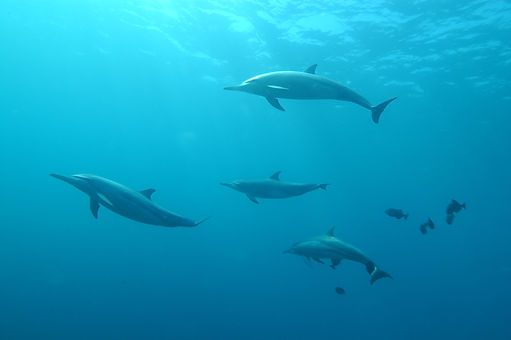

Cetaceans
Whales, dolphins and porpoises - conservation, research, education, protection
Oceanomare Delphis Onlus
Italy
Oceanomare-Delphis research and monitor cetaceans in the Mediterranean, with aim of conserving cetaceans and marine biodiversity. The focus is on non-invasive studies, promoting education and conservation programmes and enhancing public awareness of, and concern for, cetaceans and the marine environment. ODO advocates for financial support of scientific and conservation programmes and facilitates dissemination of results through professional networking, capacity building, public outreach and scientific publications. The organisation believes the application of scientific knowledge to management and policy is essential for effective cetacean conservation. The Ischia Dolphin Project is one of their many initiatives.
Oceans North
Canada
With offices in Ottawa, Winnipeg and Halifax, Oceans North supports marine conservation in partnership with Indigenous and coastal communities. Their science- and community-based conservation in the Arctic regions of Canada and Greenland has the goal to promote policies and programs that address the unprecedented environmental changes taking place in the North and ensure that its waters are protected within the framework of Inuit knowledge, rights and consultation.
Pacific Whale Foundation
Hawaii
The Pacific Whale Foundation conducts whale research and educates the public in an effort to save vulnerable species of whales from extinction. Their stated mission is 'to protect the ocean through science and advocacy, and to inspire environmental stewardship.' PWF conducts research, education and conservation programs for the communities in which it serves.
Pelagos Cetacean Research Institute
Greece
The Pelagos Cetacean Research Institute is a scientific non-profit organisation aiming to the study and conservation of cetaceans, including whales, dolphins, porpoises and a few more related species. Using science as a tool, the Institute is constantly expanding the limits of knowledge about cetaceans in the Greek Seas and the Mediterranean This knowledge is then spread to the society and used as a base start for conservation efforts focused on cetacean species populations.
Pelagos Sanctuary
Monaco
Pelagos Sanctuary is a Protected Area for marine mammals between France, Italy and Monaco. The Sanctuary is a marine area of 87,500 sq. km; a rough estimate lists more than 8,500 macroscopic animal species representing between 4 % and 18 % of global marine species, a remarkable biodiversity. The large mammals include cetaceans, specifically whales and dolphins, and seals. Within this area, research is conducted. Their role in educating the public and raising awareness of the conservation issues facing marine life is evident in the website, with information about strandings networks, the threats posed by human activity, amongst others.
RIMS Roatan Institute for Marine Sciences
Honduras
Founded in 1989 by the owners of Anthony's Key Resort, the Institute's purpose is to preserve Roatan's natural resources through education and research. The main focus of their educational programmes is on dolphins, and coral reefs, within the tropical marine ecosystems where they are based. Internships and short-term course, including dolphin encounters.
Raggy Charters
South Africa
Raggy Charters offers guided tours, led by conservationist, wildlife educator and marine safari specialist Lloyd Edwards, to see whales, dolphins, seals, sharks, penguins, and other marine in Algoa Bay. In addition to the marine education element, using funds generated by the ecotours, they run a number of conservation and research projects through the Baywatch Marine Conservation Project. These include advocating on behalf of and protecting the penguin colonies on St Croix Island and sharks in Algoa Bay, reducing plastic pollution via beach cleanups and educating on the subject, and educating the locals youth in particular on the importance of marine life. Cetaceans are another focus, specifically humpback whales, with the Southern Hemisphere Humpback Whales Migration Routes of particular interest, working with the World Cetacean Alliance. Raggy Charters' Welcoming the Whales to Algoa Bay Festival is an annual event, in 2021 in its fourth year, with the whale festival concept expanding along the coastline of South Africa.
SANCET
Montenegro
SANCET is a stranding network, the first of its kind in the Southern Adriatic Region of the Mediterranean. They collect, coordinate, and collaborate stranding data for the scientific efforts of all parties involved. This stranding network has been created by the researchers and volunteers of Montenegro Dolphin Research (MDR) under the supervision of DMAD (Marine Mammals Research Association). The project plans a database of stranding information, with citizen science involvement in reporting strandings.
SEAME Sardinia
Sardinia, Italy
SEAME Sardinia is a conservation organization with the mission to protect cetaceans in the Mediterranean Sea, combining research with citizen science and education. Founded by a group of marine biologists, they offer active learning by direct involvement in research, education and conservation of whales, dolphins and their habitat. SEAME was created in collaboration with the University of Sassari (DIPNET) studying cetaceans offshore North-eastern Sardinia
Save Japan Dolphins
Japan
In 2004, the International Marine Mammal Project (IMMP) initiated the Save Japan Dolphins campaign to end the cruel drive hunts. Through their educational work in Japan, the number of people eating dolphin meat has dropped dramatically. However, the Taiji dolphin slaughter continues. The Academy Award-winning documentary The Cove depicts the work of the International Marine Mammal Project in opposing the dolphin hunts in Taiji. Despite government opposition, they continue to work inside Japan with local activists and organizations to stop the killing. And consumption of dolphin meat.